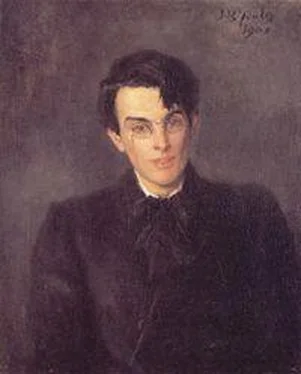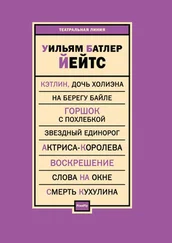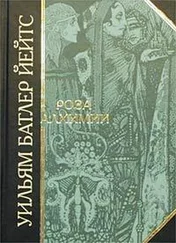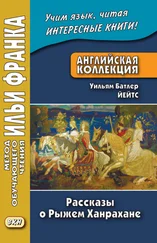Уильям Йейтс - Стихи. (В переводах разных авторов)
Здесь есть возможность читать онлайн «Уильям Йейтс - Стихи. (В переводах разных авторов)» весь текст электронной книги совершенно бесплатно (целиком полную версию без сокращений). В некоторых случаях можно слушать аудио, скачать через торрент в формате fb2 и присутствует краткое содержание. Жанр: Поэзия, на русском языке. Описание произведения, (предисловие) а так же отзывы посетителей доступны на портале библиотеки ЛибКат.
- Название:Стихи. (В переводах разных авторов)
- Автор:
- Жанр:
- Год:неизвестен
- ISBN:нет данных
- Рейтинг книги:5 / 5. Голосов: 1
-
Избранное:Добавить в избранное
- Отзывы:
-
Ваша оценка:
- 100
- 1
- 2
- 3
- 4
- 5
Стихи. (В переводах разных авторов): краткое содержание, описание и аннотация
Предлагаем к чтению аннотацию, описание, краткое содержание или предисловие (зависит от того, что написал сам автор книги «Стихи. (В переводах разных авторов)»). Если вы не нашли необходимую информацию о книге — напишите в комментариях, мы постараемся отыскать её.
Стихи. (В переводах разных авторов) — читать онлайн бесплатно полную книгу (весь текст) целиком
Ниже представлен текст книги, разбитый по страницам. Система сохранения места последней прочитанной страницы, позволяет с удобством читать онлайн бесплатно книгу «Стихи. (В переводах разных авторов)», без необходимости каждый раз заново искать на чём Вы остановились. Поставьте закладку, и сможете в любой момент перейти на страницу, на которой закончили чтение.
Интервал:
Закладка:
MICHAEL.I will go with you.
BRIDGET.It is not her friends you have to go and welcome, Michael; it is the girl coming into the house you have to welcome. You have plenty to do, it is food and drink you have to bring to the house. The woman that is coming home is not coming with empty hands; you would not have an empty house before her. [To the OLD WOMAN.] Maybe you don't know, ma'am, that my son is going to be married to-morrow.
OLD WOMAN.It is not a man going to his marriage that I look to for help.
PETER [to BRIDGET].Who is she, do you think, at all?
BRIDGET.You did not tell us your name yet, ma'am.
OLD WOMAN.Some call me the Poor Old Woman, and there are some that call me Cathleen, the daughter of Houlihan.
PETER.I think I knew someone of that name once. Who was it, I wonder? It must have been someone I knew when I was a boy. No, no, I remember, I heard it in a song.
OLD WOMAN[who is standing in the doorway]. They are wondering that there were songs made for me; there have been many songs made for me. I heard one on the wind this morning. [She sings.]
Do not make a great keening When the graves have been dug to-morrow. Do not call the white-scarfed riders To the burying that shall be to-morrow.
Do not spread food to call strangers To the wakes that shall be to-morrow; Do not give money for prayers For the dead that shall die to-morrow …
they will have no need of prayers, they will have no need of prayers.
MICHAEL.I do not know what that song means, but tell me something I can do for you.
PETER.Come over to me, Michael.
MICHAEL.Hush, father, listen to her.
OLD WOMAN.It is a hard service they take that help me. Many that are red-cheeked now will be pale-cheeked; many that have been free to walk the hills and the bogs and the rushes will be sent to walk hard streets in far countries; many a good plan will be broken; many that have gathered money will not stay to spend it; many a child will be born, and there will be no father at its christening to give it a name. They that had red cheeks will have pale cheeks for my sake; and for all that, they will think they are well paid.
[She goes out; her voice is heard outside singing.]
They shall be remembered for ever, They shall be alive for ever, They shall be speaking for ever, The people shall hear them for ever.
BRIDGET [to PETER].Look at him, Peter; he has the look of a man that has got the touch. [Raising her voice.] Look here, Michael, at the wedding-clothes. Such grand clothes as these are. You have a right to fit them on now; it would be a pity to-morrow if they did not fit. The boys would be laughing at you. Take them, Michael, and go into the room and fit them on. [She puts them on his arm.]
MICHAEL.What wedding are you talking of? What clothes will I be wearing to-morrow?
BRIDGET.These are the clothes you are going to wear when you marry Delia Cahel to-morrow.
MICHAEL.I had forgotten that.
[He looks at the clothes and turns towards the inner room, but stops at the sound of cheering outside.]
PETER.There is the shouting come to our own door. What is it has happened?
[PATRICK and DELIAcome in.]
PATRICK.There are ships in the Bay; the French are landing at Killala!
[PETERtakes his pipe from his mouth and his hat off, and stands up. The clothes slip from MICHAEL's arm.]
DELIA.Michael! [He takes no notice.] Michael! [He turns towards her.] Why do you look at me like a stranger?
[She drops his arm. BRIDGET goes over towards her.]
PATRICK.The boys are all hurrying down the hillsides to join the French.
DELIA.Michael won't be going to join the French.
BRIDGET [to PETER].Tell him not to go, Peter.
PETER.It's no use. He doesn't hear a word we're saying.
BRIDGET.Try and coax him over to the fire.
DELIA.Michael! Michael! You won't leave me! You won't join the French, and we going to be married!
[She puts her arms about him; he turns towards her as if about to yield. OLD WOMAN's voice outside.]
They shall be speaking for ever, The people shall hear them for ever.
[MICHAELbreaks away from DELIA and goes out.]
PETER [to PATRICK,laying a hand on his arm]. Did you see an old woman going down the path?
PATRICK.I did not, but I saw a young girl, and she had the walk of a queen..
Примечания
1
[ИЛ, № 10, 2005]
2
© Григорий Кружков. Эссе, перевод, 2005
3
Джон Китс — Джону Тейлору. 27 февраля 1818 г.
4
Джон Китс. «Ода Праздности».
5
«All its indifference is a different rage». From «Codicil» by Derek Walcott.
6
Крик павлина и конец эстетической эпохи // Иностранная литература, 2001, № 1. В этой статье делается попытка толкования внезапного павлиньего крика в стихах Йейтса, а также Мандельштама («Музыка на вокзале») и Уоллеса Стивенса («Доминация черных тонов»).
7
A. Norman Jeffares. A New Commentary on the Poems of W. B. Yeats. Stanford, California: Stanford UP, 1984.
8
John Unterecker. A Reader’s Guide to William Butler Yeats. New York: Octagon Books, 1983.
9
Patrick J Keane. Yeats’s Interactions with Tradition. Columbia, Missouri: UMP, 1987.
10
Эта строфа использована в переводах из Гарация Современником Марвелла сэром Ричардом Фэншо (1608–1664). Отдельным сборником его переводы вышли в 1652 г.
11
Цит. по: Jeffares, A. Norman. A New Commentary on the Poems of W. B. Yeats. P. 224.
12
Примечания (с) Анна Блейз
13
Кулэ (Coole) — парк Кулэ, имение Августы Грегори в графстве Голуэй. Леди Августа Грегори (1852–1932) — подруга и покровительница Йейтса; вместе с ним основала Ирландский литературный театр и Театр Аббатства в Дублине (в 1904 г.); автор пьес, переводчик ирландских саг.
14
Дромахар (Dromahair) — деревня к юго-востоку от озера Лох-Гилл, в графстве Лейтрим.
15
Лиссадел (Lissadell) — приморский район в графстве Слайго, на северном побережье залива Драмклифф. В Лиссаделе находился дом семейства Гор-Бут, из которого происходили подруги Йейтса Констанс (1868–1927) и Ева (1870–1926).
Читать дальшеИнтервал:
Закладка:
Похожие книги на «Стихи. (В переводах разных авторов)»
Представляем Вашему вниманию похожие книги на «Стихи. (В переводах разных авторов)» списком для выбора. Мы отобрали схожую по названию и смыслу литературу в надежде предоставить читателям больше вариантов отыскать новые, интересные, ещё непрочитанные произведения.
Обсуждение, отзывы о книге «Стихи. (В переводах разных авторов)» и просто собственные мнения читателей. Оставьте ваши комментарии, напишите, что Вы думаете о произведении, его смысле или главных героях. Укажите что конкретно понравилось, а что нет, и почему Вы так считаете.








